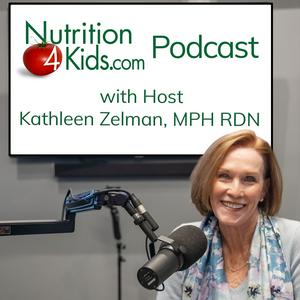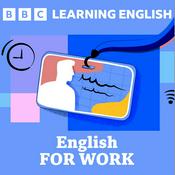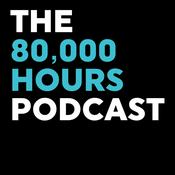6 episodes
- Today's podcast is about health and happiness at every stage of our children’s development, no matter what their size, and how we as parents can help our kids build healthy habits.
To guide us through the challenges is leading pediatric nutritionist and registered dietician, Jill Castle, MS, RDN. A mom of four with over 30 years of professional experience, Jill has dedicated her career to helping families raise confident, well-nourished kids.
A good read on nourishing your child
Jill’s latest book is Kids thrive at every size: how to nourish your big, small, or in-between child for a lifetime of health and happiness. In it, Jill offers a whole-child approach on raising healthy kids no matter their size or stage of growth.
Jill firmly believes that feeding kids isn't just about what's on their plate. It's about creating a positive, flexible approach that supports their overall development, inspiring us all to think differently about health and wellbeing in children.
The challenge: keeping kids interested in a healthy lifestyle
We live in a world where parents struggle with their children’s lack of interest in healthy foods. Kathleen asks Jill how she would handle a client with a child whom the growth curve says is overweight, and the child has bad eating habits. They discuss how to get those children back on track.
Jill discusses her systematic approach to working with families and helping them encourage their children, offer them more nutritious foods, and set up their home environment so that it's more structured and predictable. She notes that children respond really well to having a routine with food.
Jill explains what it means to build structure around meals and snacks, and what to do when their children are constantly hungry and asking for food. She offers a strategy to set up meals and snacks from a timing perspective, from a nutrient perspective, adding foods that we know are more satiating to both meals and snacks. The trick is to get our kids to feel full when they're done eating and don’t need to ask for more food in between meals. She emphasizes the two foods kids will never gain weight eating, and how to make those foods more appealing.
Why we should give kids sweets and treats
Kathleen asks whether we shouldn't have anything in the house then that's not filling the healthy needs of a child; ie, sweets and treats. Jill surprises us with her answer, saying that it’s important to have those foods in the house because it neutralizes them a bit and doesn't put them on a pedestal. Putting snacks on a pedestal makes them very enticing to children. Jill explains the unpredictability in children's lives around sweets and treats, encourages families to make them predictable, and shows us how.
The eight pillars of wellness
In a world where children get more anxious about food and depressed about their bodies, Jill recommends a more holistic approach: incorporating habits that optimize health and prevent health conditions. She helps families understand the importance of habits and navigate the obstacles that they will inevitably face, so that they can raise kids who develop healthy habits and can grow up feeling proud about their bodies and healthy in their bodies. The two then discuss the eight pillars of wellness in Jill’s book.
The topic of bullies
Jill notes that when you look at the research on children who carry extra weight, over 90% of those kids experience some level of stigma, bullying either from their own families, their peers, healthcare providers, or other adults in their lives, bullying is very prevalent in their lives.
She shares that one reason she wrote her latest book was to open parents' eyes to really help their children feel good about themselves, no matter the type of body they're in. Her book serves as an advocacy for all of us to really be aware and start changing the language that we use about health conditions related to extra weight.
Higher risk for developing diabetes or hypertension
Bullying aside, there are absolutely health concerns associated with carrying too much weight. Jill and Kathleen discuss how to manage that very sensitive topic. To do this, Jill differentiates body functioning from size.
She looks at the conditions that go with carrying excess body weight: hypertension, high blood pressure, high cholesterol, sleep apnea, gastroesophageal reflux disease. She is careful not to assume a child has a health concern just because the child is larger. She focuses instead on getting to a healthier place, if necessary, with movement, nutritional intake, and sleep, to help the body function better.
She concludes that families are not getting nutrition education at an early stage. Kids are often well down the road with some of these habits that are not health supporting before the issues are noticed and addressed. We need to be much more proactive in terms of prevention, education, lifestyle behaviors, good nutrition, etc.
Weight loss medications for kids
GLP1 medications for children, such as Ozempic and Wegovy, are being used in children who have significant metabolic dysfunction; for example, pre-diabetes. The decision to use one of these medications is a very personal decision between families and their medical team. When that decision is made, the medical team will ask a family to participate in what they call intensive health behavior and lifestyle treatment: health habits and nutrition optimization, physical movement, optimizing sleep: the eight pillars of wellness.
We still don't know long-term effects of these medications on growing bodies. And ideally, we don't want kids to be on these medications for their life. We want them to, you know, learn health behaviors and learn how to eat well and move their bodies and get to a healthy place where their body is functioning optimally without these medications. Jill’s answer is always to have a conversation with your healthcare provider.
Her job is to help families with these lifestyle behaviors, to motivate them and keep them accountable for lifestyle behaviors that we know from the evidence are effective at building physical health and emotional well being in children.
Parents have the power to influence their children
Jill concludes that resources are available to support parents in helping their families build healthy, happy bodies. She encourages parents to not succumb to social pressures that dictate children need to look a certain way or to do nothing. There's a positive, nurturing way to protect your child's emotional well being and help their physical health.
Visit our website, Nutrition4Kids.com, for lots of information, articles and videos to help you promote well being for your family. We hope you’ll join us, give our podcast a favorable rating, tell your friends about what Nutrition4Kids has to offer, and share on social media. - What are some common pediatric gastrointestinal issues?
The episode focuses on recognizing when typical ailments, such asdiarrhea[sc1]and vomiting, might indicate a more serious condition requiring medical attention. Dr. Oliva highlights how viral infections often cause such symptoms and explains how parents can manage these issues at home. She also offers solutions on managing GI symptoms in babies, emphasizing the importance of avoiding water in infants[sc2]under one year.
Managing GI symptoms in children: What parents need to know
The conversation expands to address abdominal pain, detailing causes that range from viral infections to emotional stress and functional disorders. Dr. Oliva provides guidance on dietary changes, noting that while temporary removal of milk may help, long-term adjustments, especially for gluten[sc3], should be guided by medical advice and testing.
Kathleen and Dr. Oliva discuss the importance of being cautious when altering a child’s diet, especially with food sensitivities likelactose[sc4]and gluten. Kathleen emphasizes the nutritional benefits of cow’s milk[sc5] and dairy products, urging parents to consult doctors before removing key foods. Dr. Oliva highlights the challenges in managing dietary changes for children, particularly those with poor eating habits[sc6], and stresses the need for a balanced approach.
Prevention and treatment tips for constipation in kids
They discuss the common issue of constipation[sc7]in children, and what the causes are. Dr. Oliva explains what to do if constipation persists for more than a couple of weeks, including treatment options and what to increase in kids’ diets[sc8]as preventive measures.
How to help manage infant reflux in your baby
Their conversation also covers the topic of infant reflux[sc9], explaining why most babies spit up. They provide guidance on managing this issue, such as proper feeding positions and the use of thickened formulas[sc10]if needed.
Listen to this Nutrition4Kids podcast episode to learn how you can help avoid GI issues[sc11]in your kids, and how to manage symptoms as they arise, no matter what age your child is, from toddlers[sc12] toteens[sc13].
[add Kathleen's takeaways--do the same on Bailey's]
About Maria Oliva-Hemker, MD
Dr. Maria Oliva-Hemker is Director of the Division of Pediatric Gastroenterology, Hepatology and Nutrition at the Johns Hopkins University School of Medicine (JHUSOM) in Baltimore, Maryland. She is also the Vice Dean for Faculty where she oversees an office that serves more than 5000 full-time and part-time SOM faculty. Dr. Oliva is the first Hispanic woman to rise through the academic ranks at JHUSOM to be promoted to tenured Professor. She is the inaugural Stermer Family Professor of Pediatric Inflammatory Bowel Disease and the Mary Wallace Stanton Professor for Faculty Affairs.
Dr. Oliva is a highly recognized clinician researcher with more than 110 peer-reviewed publications and more than 100 national and international invited talks. She has held leadership positions in multiple organizations including the North American Society of Pediatric Gastroenterology, Hepatology and Nutrition (NASPGHAN), the American Gastroenterological Association (AGA), the American Academy of Pediatrics (AAP) and the Crohn’s and Colitis Foundation and has served on the editorial boards of high impact medical journals. She is an editor-in-chief of the book "Your Child with Inflammatory Bowel Disease: A Family Guide for Caregiving."
Dr. Oliva has received multiple honors including the AGA Pediatric Gastroenterology and Developmental Biology Section Research Mentor Award and the AAP Murray Davidson Award which recognizes an outstanding clinician, educator and scientist who has made a significant contribution to the field of pediatric gastroenterology and nutrition. She has received a "Top Doctor" designation by multiple organizations including US News & World Report and she was chosen for the cover of Baltimore Magazine’s Top Doc issue.
[sc1]https://nutrition4kids.com/articles/ongoing-diarrhea-diet-can-help/
[sc2]https://nutrition4kids.com/articles/when-to-give-your-baby-water/
[sc3]https://nutrition4kids.com/articles/gluten-and-gluten-related-diseases-a-comprehensive-overview/
[sc4]https://nutrition4kids.com/articles/milk-allergy-or-lactose-intolerance/
[sc5]https://nutrition4kids.com/articles/comparing-alternative-milks-milk-like-beverages/
[sc6]https://nutrition4kids.com/articles/how-to-fix-common-mealtime-eating-problems/
[sc7]https://nutrition4kids.com/articles/managing-constipation/
[sc8]https://nutrition4kids.com/articles/fiber-grandma-called-it-roughage/
[sc9]
https://nutrition4kids.com/articles/spitting-up-or-reflux-what-to-look-for/
[sc10]https://nutrition4kids.com/articles/why-is-my-baby-spitting-up/
[sc11]https://nutrition4kids.com/articles/super-smoothies-solve-kids-and-adults-problems/
[sc12]https://nutrition4kids.com/articles/nourishing-your-toddler-a-guide-to-healthy-eating/
[sc13]https://nutrition4kids.com/articles/good-table-manners-for-all-ages/
Visit our website, Nutrition4Kids.com, for lots of information, articles and videos to help you promote well being for your family. We hope you’ll join us, give our podcast a favorable rating, tell your friends about what Nutrition4Kids has to offer, and share on social media. - Snacks, the healthy ones, can help kids focus and keep their energy up
By Bailey Koch, RD, CSP, LD and Kathleen Zelman, RDN
Get ready for school! As parents we know the importance of good nutrition, adequate sleep and regular physical fitness[sc1]. But packing lunches[sc2] and providing nutritious snacks can be a conundrum, especially when there are so many processed snacks[sc3]that sound healthy – parents are confused. Here to help and enlighten us today is Bailey Koch.
Bailey is a registered dietitian for children with two decades of experience, specializing in pediatric gastroenterology. In this interview, Kathleen and Bailey focus on preparing kids for a successful school day through balanced nutrition, with a particular emphasis onsnacks[sc4].
Bailey stresses the importance of providing children with snacks that have two things to help sustain energy and maintain focus throughout the school day. She explains that snacks should be thought of as "mini meals" rather than simple treats.
Nutrient-dense snacks to avoid energy crashes
Bailey highlights how common processed snacks, like those high in sugar[sc5]and low in nutrients, cause energy crashes and affect children’s attention[sc6]. She provides practical suggestions, including examples of nutrient-dense snacks with at least five grams ofprotein[sc7], to help sustain kids’ energy throughout the day. Bailey advises parents to focus on snacks that will fuel kids' bodies and minds, particularly during long school days.
Nutrient substitution and picky eaters
Kathleen and Bailey discuss practical tips for improving children's nutrition, focusing on freeze-dried vegetables, fruit[sc8]substitution, and sugar cravings. Bailey explains what freeze-dried vegetables are, where they are located at certain (not all!) grocery stores, and why they are a great alternative to fresh produce. She explains why substituting fruit for vegetables is not the best idea.
Bailey also addresses concerns about picky eaters[sc9], advising parents what to moderate in kids’ diets. When asked about multivitamins[sc10], Bailey acknowledges their role for very picky eaters but gives some very poignant advice.
Strategies for curbing sugar cravings
Lastly, Bailey offers strategies for curbing sugar cravings, such as what to limit in kids’ diets by opting for healthier alternatives. By making gradual changes, parents can reshape their children's eating habits, reducing the demand for sweets over time.
Following Bailey's expert advice, parents can ensure their children maintain balanced nutrition, improve focus, sustain their energy during the long school day, and develop healthier eating[sc11]habits for the long term.
About Bailey Koch, RD, CSP, LD
Bailey is a Registered Dietitian who is board certified as a Specialist in Pediatric Nutrition. She started her career at Northside Hospital and then at Children’s Healthcare of Atlanta at Scottish Rite with Pediatric Nutrition as her main focus. While at Northside, she provided support in all areas of the hospital including the high-risk perinatal unit and 100 bed NICU. At Scottish Rite, she was involved in the care of a wide variety of children working with the AFLAC Cancer Center, Neonatal and Pediatric Intensive Care Units, Neonatal follow-up clinic and the Inpatient Rehabilitation Unit.
In 2006 Bailey joined the GI Care for Kids team and founded Atlanta Pediatric Nutrition in 2008.While at GI Care for Kids, she has developed an interest in helping children with Celiac Disease, food allergies, eosinophilic esophagitis, FPIES, failure to thrive and feeding difficulties among other diagnoses.
Bailey graduated from the University of Mississippi and completed her dietetic internship at Emory University. She is 1 of only 30 Board Certified Specialists in Pediatric Nutrition in the state of Georgia. Bailey is a Food Allergy Specialist and holds a certificate of training in childhood and adolescent weight management. She has also held the specialty credential of Certified Nutrition Support Dietitian.
Bailey is a founding member and has served on various committees of the Nutrition Council for Pediatric Nutrition Professionals, which is part of the North American Society for Pediatric
Gastroenterology and Nutrition. She is a member of the Medical Advisory Board for both The FPIES Foundation and Nutrition4Kids.com. Bailey is an expert witness in pediatric nutrition for the State of Georgia and the United States Department of Justice. She has served on the Greater Atlanta Dietetics Association Board as the State Professional Recruitment Coordinator.
Bailey has been involved with research on the Specific Carbohydrate Diet in Crohn’s Disease and served as one of the primary consultants for the book What to Feed Your Baby. She has authored numerous articles and blogposts for Nutrition4Kids.com and co-authored the book 500 Baby and Toddler Dishes: Nutritious Make-ahead Meals for Baby’s First Foods and Beyond.
A sought-after speaker in pediatric nutrition, she has presented to multiple groups of medical professionals, including physicians, therapists, nurses and other dietitians. Education of future dietitians in pediatrics is important to her, thus she serves as a preceptor to dietetic interns throughout the country who are interested in the specialized area of pediatric nutrition. She has been a guest speaker for CNN Newsroom in addition to being interviewed for many magazine and news articles on the topic of pediatric nutrition.
Outside of work, Bailey enjoys spending time with her family (husband, son, daughter, boxer and 2 bunnies), spending time with friends, working out, shopping and traveling.
[sc1]https://nutrition4kids.com/articles/active-weekends-encouraging-fun-and-healthy-physical-activity-for-kids/
[sc2]https://nutrition4kids.com/articles/easy-ideas-for-lunch/
[sc3]https://nutrition4kids.com/articles/the-impact-of-processed-foods-on-our-health-and-well-being/
[sc4]link to
https://nutrition4kids.com/articles/smart-choices-22-healthy-after-school-snacks/
[sc5]https://nutrition4kids.com/articles/theres-more-sugar-in-foods-and-drinks-than-you-might-think/
[sc6]https://nutrition4kids.com/articles/nourishing-your-child-with-adhd-strategies-for-healthy-eating/
[sc7]https://nutrition4kids.com/articles/5-protein-secrets-every-parent-needs-to-know/
[sc8]link to
https://nutrition4kids.com/articles/6-hacks-and-tips-on-shopping-for-fruits-and-vegetables/
[sc9]https://nutrition4kids.com/articles/picky-eaters-101-from-stress-to-success/
[sc10]https://nutrition4kids.com/articles/does-your-child-need-vitamins/
[sc11]https://nutrition4kids.com/articles/13-simple-tips-for-healthier-eating/
Visit our website, Nutrition4Kids.com, for lots of information, articles and videos to help you promote well being for your family. We hope you’ll join us, give our podcast a favorable rating, tell your friends about what Nutrition4Kids has to offer, and share on social media. - Not All processed foods are harmful, but some are linked to obesity and heart disease [subtitle]
By Elizabeth M. Ward, MS, RDN and Kathleen Zelman, RDN
In this episode of Nutrition4Kids Podcasts[sc1], host Kathleen Zelman dives into the complexities of balancing healthy eating and processed foods for kids with guest Elizabeth Ward, a nutrition expert, registered dietician, and mother of three. The episode highlights the alarming fact that 50-60% of daily calories come from ultra-processed foods, which are often linked to chronic health issues like obesity[sc2]and heart disease. Ward helps clear up the confusion around what qualifies as "processed" foods, emphasizing that not all processed foods are harmful. For example, milk and bread are processed to varying degrees but offer essential nutrients.
Understanding processed foods and their nutritional value
Ward discusses the dangers of demonizing all processed foods, pointing out that many processed items, like fortified cereals and whole wheat bread[sc3], are vital sources of nutrients. She advises parents to focus on the nutritional value of foods rather than getting caught up in their processing levels. Kathleen and Elizabeth also explore practical strategies for balancing kids' desires for unhealthy snacks with healthier options, stressing the importance of moderation and education. Ward emphasizes that parents should control their child’s early exposure to ultra-processed foods[sc4]while teaching them about balance as they grow.
Practical tips for healthier meals and snacks
The episode is packed with tips on preparing healthier alternatives at home, from making homemade chicken nuggets to using store-bought dough for pizza. Ward encourages parents to make small, manageable changes to promote healthier eating habits in their children, helping them develop a long-term relationship with nutritious foods.
Smart choices and long-term healthy eating habits
The episode offers some excellent takeaways for parents on balancing processed foods and creating nutritious meals for children. It touches on many key points, such as sneaking in veggies with mac and cheese, being smart about label reading, understanding additives like ascorbic acid (Vitamin C[sc5]), and challenging the myth of "clean eating."
The advice Elizabeth offers is about choosing wisely and incorporating nutritious options like frozen vegetables[sc6], whole grains, and treating snacks[sc7]as "mini meals" instead of indulgences. She emphasizes setting a good example as parents, modeling positive behaviors, [sc8]and creating healthy household environments crucial for forming long-term habits.
Key takeaways
Nutrients of foods are more important than processing.
Processing is a spectrum, many foods need to be processed to be edible – like wheat.
Processing is not a bad thing, it allows foods to sit on grocery shelves, be more nutritious and more.
Clean eating is a trendy term, it doesn’t mean anything according to label standards.
Overall dietary patterns are what really matter most.
Avoid ultra processed foods that are loaded with sugar, saturated fat, salt and low in fiber and nutrients.
[sc1]Link
[sc2]Link
https://nutrition4kids.com/articles/when-youre-overweight-as-a-child-scary-facts-and-some-suggestions/
[sc3]link to
https://nutrition4kids.com/articles/6-hacks-for-buying-healthy-breads-cereals-and-pasta/
[sc4]link to
https://nutrition4kids.com/articles/the-impact-of-processed-foods-on-our-health-and-well-being/
[sc5]link to
https://nutrition4kids.com/articles/what-vitamins-and-minerals-do-and-where-to-get-them-quick-answers/
[sc6]link to
https://nutrition4kids.com/articles/6-hacks-and-tips-on-shopping-for-fruits-and-vegetables/
[sc7]link to
https://nutrition4kids.com/articles/smart-choices-22-healthy-after-school-snacks/
[sc8]link to
[sc8]https://nutrition4kids.com/articles/show-your-kids-how-to-eat-and-act-let-them-follow-your-good-example-be-your-best-self-your-kids-follow-their-role-models/
Visit our website, Nutrition4Kids.com, for lots of information, articles and videos to help you promote well being for your family. We hope you’ll join us, give our podcast a favorable rating, tell your friends about what Nutrition4Kids has to offer, and share on social media. - Many parents are faced with the challenges of allergies in their children. From switching infant formulas to diagnosing food allergies versus food intolerances. Compounded by seasonal allergies this time of year.
So today we bring you an extraordinary expert to answer your questions from preventing allergies in infancy to managing food and seasonal allergies, to understanding the options in allergy treatment.
Dr. Hugh A. Sampson is an eminent leader in the field of allergy disorders. He is the Kurt Hirschhorn Professor of Pediatrics at the Icahn School of Medicine in New York. He has over 40 years’ research experience in food allergy disorders. He has authored or coauthored more than 550 articles, 90 book chapters, and 5 books.
The most common food allergies in children are to peanuts, milk and eggs. Both eggs and milk tend to resolve by age 10 but not peanut allergies which can last a lifetime. Most children who have allergies tend to be allergic to more than one but don’t overinterpret test results. Work with your allergist to determine food tolerance and a registered dietitian to evaluate nutritional completeness of your child’s diet.
Cashew allergies are on the rise as are allergies in children in general. It is unknown why but one theory is that we are too clean.
Research has shown that when babies from 4-6 months old are exposed to peanut protein, they can develop tolerance. This concept of early introduction is being studied for other foods.
For seasonal allergies, when buds are on the trees, start a regime of antihistamines on a regular basis until the pollen is gone. Avoid opening windows in the early morning when pollen is highest. Air-conditioner and air-purifiers can help with pollen but not as much with dust mites. Washing sheets often helps. Eye drops and allergy shots also help.
Visit our website, Nutrition4Kids.com, for lots of information, articles and videos to help you promote well being for your family. We hope you’ll join us, give our podcast a favorable rating, tell your friends about what Nutrition4Kids has to offer, and share on social media.
More Education podcasts
Trending Education podcasts
About Nutrition4Kids
Our goal for the Nutrition4Kids podcast is to provide listeners with inspiration, skills and parenting tips that are based on evidence, easy to understand, and doable for parents and kids. We want to be your trusted source for information that helps you nourish your family.
From breast and formula feeding to introducing solid foods, food allergies, GI issues to feeding young athletes and many other medical conditions. We will tap leading experts in pediatric nutrition from our advisory board and beyond.
Podcast websiteListen to Nutrition4Kids, Begin Again with Davina McCall and many other podcasts from around the world with the radio.net app

Get the free radio.net app
- Stations and podcasts to bookmark
- Stream via Wi-Fi or Bluetooth
- Supports Carplay & Android Auto
- Many other app features
Get the free radio.net app
- Stations and podcasts to bookmark
- Stream via Wi-Fi or Bluetooth
- Supports Carplay & Android Auto
- Many other app features


Nutrition4Kids
Scan code,
download the app,
start listening.
download the app,
start listening.







































